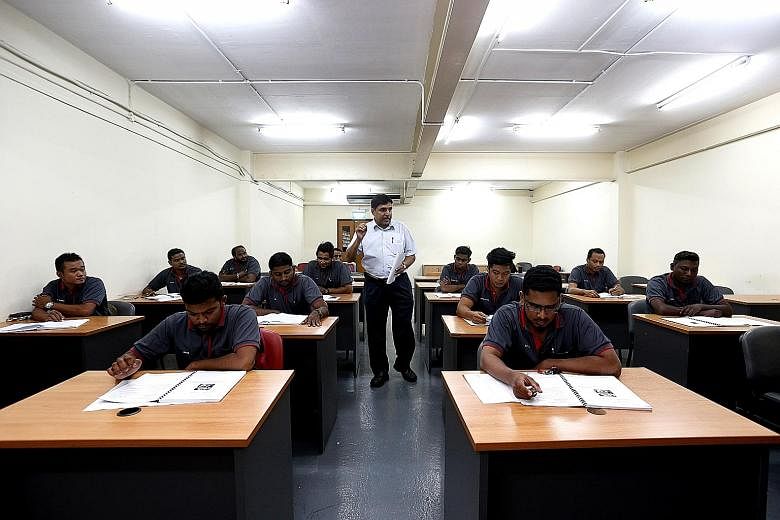When the Institute of Technical Education (ITE) was set up in 1992 to offer vocational training for students, it was viewed by some as a "last resort" for those who could not get into junior colleges or polytechnics.
Twenty-five years on, perceptions have changed. Not only has ITE produced polytechnic and university graduates, now it even attracts university degree holders who attend courses there to sharpen their skill sets for a particular industry.
Over the past few years, ITE has seen a rise in the enrolment of adult learners already holding a degree or diploma. They formed 4 per cent of the yearly intake of adult learners in 2014, but the figure grew to 10 per cent last year.
Most chose courses in engineering fields, said an ITE spokesman, and heard about the courses through word of mouth.
As it crosses into the next 25 years, ITE will ramp up its support for lifelong learning, and play a bigger role in the SkillsFuture movement, as announced by Deputy Prime Minister Tharman Shanmugaratnam earlier this year.
"Today, ITE's (continuing education) trainees are coming from all walks of life. They recognise the value of picking up technical skills through ITE's practical, hands-on training," said Mr Tharman in May.
-
10 %
Percentage of adults enrolled last year who hold a degree or diploma - up from 4 per cent in 2014.
5,000
Number of people who signed up last year for "bite-sized" modules of seven to 60 hours - compared with fewer than 1,000 in 1996. Topics include baking and Internet marketing.
1,200
Number of industry trainers from over 250 companies groomed last year by ITE to conduct on-the-job training via a train-the-trainer model.
The delivery of lessons for professionals looking to upgrade themselves is being transformed. Currently, adult learners taking part-time National Institute of Technical Education Certificate (Nitec) and Higher Nitec courses do not have to attend four of the 20 theory lessons required, as these are made available online.
By 2020, all Nitec and Higher Nitec (including part-time) courses offered by ITE will have online components to make learning more accessible for students, an ITE spokesman told The Straits Times.
ITE will also continue working with organisations such as government agencies and community groups to provide more part-time courses that are relevant to Singapore's needs.
In July, it worked with the National Environment Agency to start a course on managing a hawker business, which runs for about eight hours over three evenings. The first run attracted over 100 participants. The course will be held again in January.
ITE is now also working with the National Trades Union Congress (NTUC) on a "returnship" programme to encourage housewives to return to work. Details will be announced at a later date.
More people have also been taking up "bite-sized" modules with shorter durations of seven to 60 hours. Over 50 such modules are now available, with topics ranging from Internet marketing to baking. Last year, some 5,000 signed up for such courses, compared with just under 1,000 in 1996.
Apart from skills training, ITE has also played a role in coming up with innovations for various industries such as advanced manufacturing and engineering, health and biomedical sciences, services and digital economy, and urban solutions and sustainability.
At the three Technology Development Centres at the ITE colleges in Ang Mo Kio, Simei and Choa Chu Kang, set up in 2009, dedicated staff can work with partners in these four industries to come up with fresh innovations.
Around 80 such projects are completed every year; one is a new system for calling nurses. Adopted last year by two nursing homes run by Pacific Healthcare, it comes equipped with data analytics capabilities.
To support companies and employers, ITE also trains industry professionals to conduct on-the-job training (OJT) via a train-the-trainer model. Fujitec Singapore, which services and sells escalators and elevators, has run an in-house Nitec course on lift and escalator technology in collaboration with ITE since 1993.
Said department manager Karmachand Sahu, 62, at Fujitec: "There was no comprehensive vocational training programme in this area that was being offered back then."
By sending its own staff to conduct lectures and coach trainees in practical skills, Fujitec was able to groom skilled technicians. Most had no technical background.
"This is more convenient because we can teach (the trainees) the latest technology adopted by Fujitec, and they will be skilled enough to start work immediately after completing the course," said Mr Sahu, who has conducted in-house training at Fujitec from the outset.
Last year, ITE trained 1,200 industry trainers from over 250 companies under this scheme.
ITE chief executive Low Khah Gek said she expects the number of adult learners at ITE to increase, as companies will be sending more workers to upgrade their skills.
There will also be those looking to return to the workforce after a break, and business owners who want to be trained in specific skills such as online marketing and business analytics.
"With disruptive technology and changing economic paradigms, adult learners need to continually learn, upgrade and master new skills. ITE's niche ability to respond fast to industry changes and provide hands-on learning places us in a unique position to train adults to ensure that their skills are industry-relevant," Madam Low noted.



